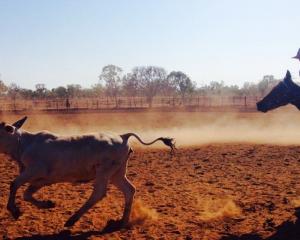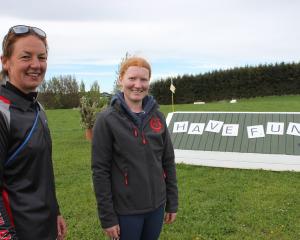Amy Watts took a wide-ranging road on her quest to becoming a vet.
Growing up on a sheep and beef farm in Waipukarau, she worked the land with her parents as most farm kids do, and wanted to become a vet to continue working with animals.
She headed to university after high school and took the pre-veterinary science classes at Massey University but failed to score highly enough for selection to the course.
Miss Watts, better known to her clients as Amy the Vet, was not letting that setback keep her from livestock.
‘‘I reared calves on a 2000-cow dairy farm for the spring then went to Australia and went travelling.’’
Her time in the United Kingdom and Ireland included the usual OE fallbacks of nannying, bartending and waitressing, but she was also able to make money riding horses in Yorkshire and Warwickshire, and worked as a stud groom in Ireland.
She flew into Zimbabwe and travelled overland through Africa to Cape Town.

Returning home and ready to face academia again, Miss Watts was accepted to the veterinary science course at Massey as a mature student.
‘‘Vet school was five years and I spent my summers shepherding,’’ she said.
‘‘Then I graduated and moved to a job in Winton.’’
That job was with a corporate practice with 20 or more vets, where her focus was on beef cattle, sheep and deer.
In 2013, she moved to Alexandra to join another large practice, where she worked for 18 months before heading back to Australia to muster cattle near Mt Isa, in northwest Queensland and the Northern Territory.
‘‘That was awesome — it was really cool,’’ she said.
The trip also cemented in her mind that she did enjoy being a vet, so she took a job in Timaru then ended up in Ranfurly, working for a practice that allowed her to take time off over the slower winter period to travel or go mustering.
In early February last year, after suggestions and murmurs of support from some of her clients to move into private practice, she decided to ‘‘give it a crack’’.
Last winter she worked some mornings on farms to supplement her veterinary work, but now worked as a vet ‘‘100%’’ and had brought in a part-time worker to help her with her least liked part of the job.
‘‘There’s always a lot of paperwork as a vet and then more associated with running a practice,’’ she said.
The best part of her job is the relationships with her clients, ‘‘being involved in their farms and being included in their decisions’’.
Specialising in beef cattle, sheep and deer, with a few dairy cow jobs added, her job is widely varied, including blood testing, pregnancy testing, ram health, velveting and parasite resistance management.
When we caught up with her, she had blood-tested deer in the morning on a farm in Cardrona Valley before heading to another just up the road to palpate rams, checking that they were ‘‘fit for service’’ and free of disease.
We joined her the next week in Becks as she pregnancy-tested dairy cows on Glen Harrex’s 8000ha beef, sheep and dairy farm.
She is president of the New Zealand Veterinary Association deer branch, one of only 11 New Zealand members of the Australian and New Zealand College of Veterinary Science in Medicine of Sheep, and served as a 2021 board observer for Deer Industry New Zealand.
She said she has never encountered any barriers as a female vet.
‘‘I’ve always been in the agricultural industry and it’s about earning respect and doing a good job,’’ she said.
Willy Scurr co-owns the 5200ha Cardrona Valley Farms which runs 13,000 stock units of sheep, cattle and deer.
Mr Scurr had used Miss Watts’ services for about five years and he said he really liked her both as a vet and as a person, and supported her starting her own practice.
‘‘It’s a big thing to break out there on your own and go for it,’’ he said. ‘‘It’s the best thing she has ever done.’’
Hamish MacKay has a 14,000ha cattle, deer and sheep farm further down Cardrona Valley, and also stayed with Miss Watts when she started out alone.
He said it was always good to support independent practices and he was impressed by Miss Watts’ knowledge of large animals and her way with the livestock.
‘‘She’s good to deal with, prompt and efficient and has a lot of knowledge of the industry,’’ he said.















